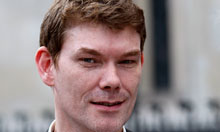Gary McKinnon will face no charges in UK
m.guardiannews.com | Dec 14th 2012
No further legal action will be taken in Britain against the computer hacker Gary McKinnon, the police and Crown Prosecution Service have announced.
The decision comes three months after the government moved to block his extradition to the United States (video) on human rights grounds.
A joint panel of the police and the CPS advised there should be no new criminal investigation into McKinnon – accused in a US court of committing "the biggest military computer hack of all time" – and that advice has been accepted.
McKinnon's mother, Janis Sharp, said: "I feel fantastic, it's just wonderful. The next thing I would like to get, impossible though it seems, would be a pardon from President Obama.
"I think it's possible because I think Obama seems like a good person and so does his wife."
She continued: "It's amazing because it's my birthday. Gary was tearful because of the relief – he was so scared. It's going to be such a nice Christmas not to have everything hanging over us.
"I feel the 10 years have been gruelling, it's been life-destroying. It's difficult to explain how bad it's been.
"To have this over is amazing. Gary's gone through enough. Other people have been accused of more serious hacking in this country and they've been given a £1,000 fine and a very short community sentence."Gary regrets what he's done. He wishes he hadn't done it. He wishes he hadn't upset the Americans. We all regret it. But I'm grateful to Theresa May that this is all over now."
A joint statement from Keir Starmer, the director of public prosecutions, and Mark Rowley, assistant commissioner of the Metropolitan police, cited the huge difficulties of charging him in the UK, and said the chances of conviction would be poor.
Nothing had changed since the original 2002 decision that the only appropriate place to try McKinnon would be the US, they said. McKinnon, 46, has been diagnosed with Asperger's syndrome and depression. With his mother Janis Sharp , he has fought extradition since the US submitted a request in 2004, almost two years after he was indicted in his absence by a federal grand jury for seven counts of computer-related crime.He admits to trawling through Nasa and other US defence sites, but insists he was only looking for evidence of UFOs; he occasionally left messages in the system, such as "your security is crap".
McKinnon has been on bail but under threat for most of the time since he was arrested in 2005. After many twists and turns in the legal process, the home secretary, Theresa May, announced in October that he would not be extradited on human rights grounds, because medical reports warned he was at risk of suicide if sent to face trial in the US.
The statement said although the US had indicated it would co-operate on bringing a prosecution in England and Wales, it would present enormous difficulties.
"The potential difficulties in bringing a case in England and Wales now should not be underestimated, not least the passage of time, the logistics of transferring sensitive evidence prepared for a court in the US to London for trial, the participation of US government witnesses in the trial and the need fully to comply with the duties of disclosure imposed on the CPS. The prospects of a conviction against Mr McKinnon which reflects the full extent of his alleged criminality are not high. "None of the reasons for the original decision in 2002 that the appropriate place for Mr McKinnon to be tried was the United States have altered. So far as the evidence is concerned, the position in 2012 is the same as it was in 2002. Most of the witnesses are in the US, as is nearly all the physical evidence and the bulk of the unused material, some of which is sensitive.
"Accordingly, in November this year, the CPS and the police met senior officials from the US department of justice to discuss the possibility of bringing the US witnesses to England and Wales for trial and of transferring all the US material to this jurisdiction to be considered."
McKinnon's lawyer, Karen Todner, said: "I have mixed feelings about this: I am pleased he is not going to be prosecuted because I wouldn't want to think he would ever spend any time in prison given his mental situation.
"But I am disappointed because the extradition warrant is still outstanding because he can't travel anywhere outside of the UK and will have this hanging over him until it's resolved. We have discussed approaching president Obama and asking for a pardon."In a statement after the extradition was blocked in October, a spokeswoman for the US department of justice said: "The United States is disappointed by the UK home secretary's decision not to extradite Gary McKinnon, particularly given the past decisions of the UK courts and prior home secretaries that he should face trial in the United States."
Original Page: http://pocket.co/spSrR
Shared from Pocket
Comments
Post a Comment